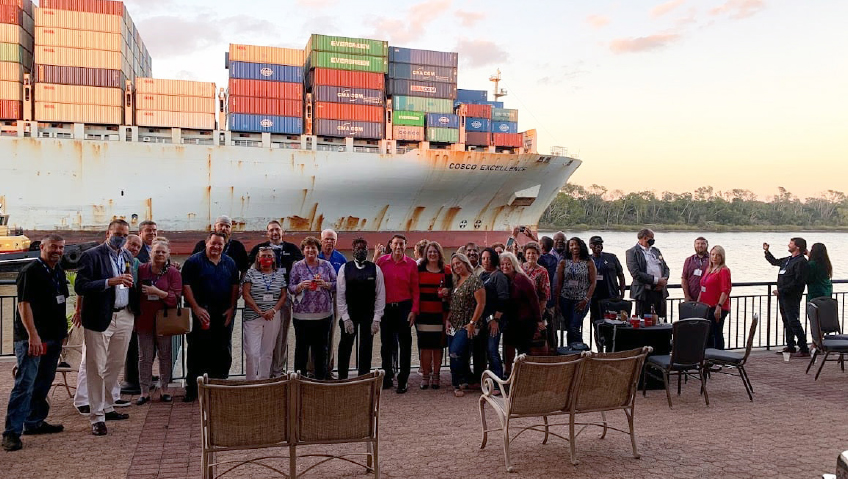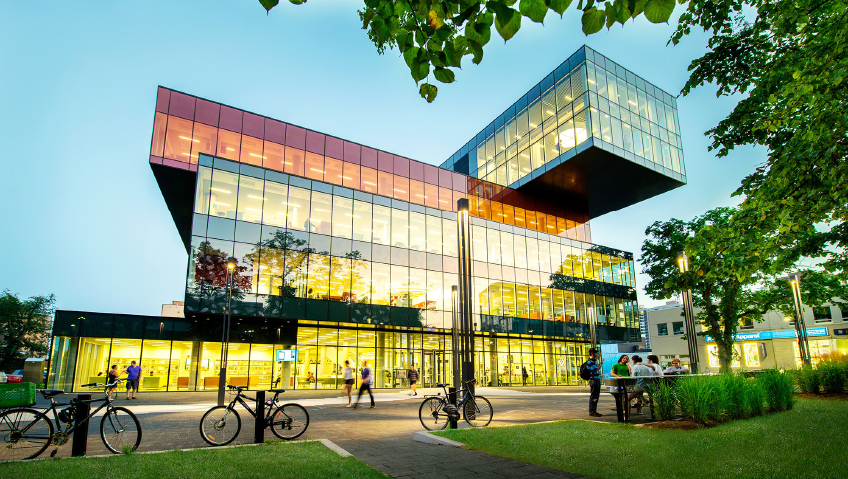The Logistics & Transportation Association of North America (LTNA) is a member-driven networking organization for individuals, non-profit clubs, associations, and corporations in any branch of the transportation, logistics, and supply chain management industry throughout the United States and Canada. The goal of the Collinsville, Illinois-based organization is to promote and support the people who make supply chain logistics work.
“Our tag line is connecting people and logistics,” says LTNA President Brad Reinhardt. “The education aspect of course is important, but our real focus is [to get] people out and networking, spending time together and learning from each other and finding that next customer, that next employee.”
Reinhardt knows from personal experience how crucial networking is in the logistics industry—or any industry for that matter. “Most of my career has been based on just networking. I own a third party logistics company and going out and networking and just expanding my personal brand has helped my career more than the work I do. I’m a huge believer in going out and networking, helping other people, always saying yes to that coffee or that lunch. Somebody’s either looking for a job or looking for that next customer.”
The goal, he explains, is “just helping them and giving back a little bit to your industry and your community. It’s good for you of course, [but also] you’re helping someone. You might not get business directly from it but it’s really more about growing community.”
COVID has made networking more important than ever. Prior to the pandemic, “no one really paid attention to how your product got anywhere,” Reinhardt says. That changed as soon as the supply chain was disrupted and consumers could no longer take a steady flow of goods for granted. “Things just moved around the world and we made it all happen and it was a great industry to be in. And then COVID hit and everybody realized, ‘where’s my toilet paper? Where’s my product?’ So it brought us out into the public eye. The President’s talking about the supply chain; everybody’s talking about products and why the supply chain is broken.”
During these high-pressure times, industry insiders with solid relationships can find support. “That networking comes in because then you can reach out to somebody you’ve met in Washington or down in Alabama or out in Seattle for assistance,” Reinhart says. “When you’re networking within your industry, or even outside it, you can get so many more resources and everything at your fingertips, rather than having to constantly research and start over every time.”
In the past, spending time with others in the industry was a given, but the digital age has created alternatives to networking face-to-face. While valuable, these remote interactions are no substitute for in-person events, Reinhardt insists. Traditionally, “networked clubs were huge. There were five hundred, a thousand people at a dinner. And then social media came and changed the networking world. People feel like being on social media or doing Zoom calls is networking—and it is a little bit. But it isn’t [the same as] going out and making those personal connections, whether it’s going to a golf tournament or a happy hour or a conference or a charity event. I think our society has lost that to an extent.”
The post-COVID world has not seen a return to pre-COVID levels of face-to-face networking, Reinhardt adds, despite the pent-up need for interaction after quarantine. “Once COVID was over I really thought these networking events were going to be packed; people were going to be itching to get out. Everybody’s events around the country are going to explode. It actually hasn’t happened. I think a lot of that is because so many people now work remotely. People at four o’clock, they’re already at home and they don’t want to go out to a happy hour dinner or anything. It was different when you’re leaving the office at five o’clock and thinking, ‘I’ll stop by that on my way home and spend a couple of hours and meet some people.’ So part of our organization’s goal is to provide people with networking opportunities, get the word out that there are networking events going on [and that] it’s still a really worthwhile thing for you to do personally.”
This advice still applies to people who are working in an office in addition to those working remotely, because you may “only know the handful of people you work with, or are in the cubicles around you,” Reinhardt says. It’s critical to form relationships beyond your office before you need them. “If you only start looking for a job when you lose your job or you want another job, that’s the wrong time. It’s almost like a sales project; you want to always have your personal branding out there and know as many people as you can in the industry.”
In addition to holding a big annual conference, LTNA works hard to facilitate local networking opportunities. The association’s website includes a list of local LTNA clubs by state and the team is always ready to assist members who are interested in forming new clubs. “I’m currently helping some folks up in Fort Wayne, Indiana start one,” Reinhart says. “I’m working down in Little Rock. We’re going to restart one in Chattanooga. We’re restarting one in Atlanta. We just recently opened one in Nashville and Kansas City.” This support comes at no cost to members. “There’re really easy to start. They don’t take any money. We’re all volunteers. We don’t have any people on the payroll.”
One of the biggest challenges facing LTNA members today is the high cost of fuel. “The diesel prices are really hurting the industry right now,” Reinhardt shares. “It’s been a struggle for the truck lines to be able to stay in business and afford to haul the freight.”
The situation has been particularly detrimental to smaller businesses. “There have been a good amount of smaller truck lines that have gone out of business here in the last two months because of the fuel prices and the softening of freight,” Reinhardt says. “So we’ve been working with a lot of shippers on trying to plan their inventories better [and getting] them to realize the ‘just in time’ model that everyone really liked to have really isn’t working in the industry we have right now because there are so many inventory issues that are out of your control. It’s better to have higher inventories right now. I think a lot of shippers are going to that model currently and I think that’ll help them get through this next little lull. We’re seeing probably next spring, next summer that a lot of these issues should be straightened out,” and everything may be “back to normal by this time next year,” he says.
As the industry overcomes current challenges, new challenges are likely to emerge. One will be the need to implement the latest technology. “Technology is definitely taking over our industry,” Reinhardt says. “Our next biggest change will be the automated trucks that are currently out there on the road. We’re all as an industry working toward how that looks, how it’s going to change what we’re doing.”
Technology is also raising consumer expectations regarding access to information. “Everybody wants the real-time tracking,” Reinhardt says. “Technology is helping people track their product from when it’s made—whether their product was made in Seattle or in China—all the way to the end user in real time.” Reinhardt and his contemporaries look forward to seeing what else is around the corner for the industry.
It’s a changing time indeed, and LTNA has been serving its members for a little over a century. The association has evolved with the industry over the years, but has stayed true to its core focus of connecting people. Whether these people are working to overcome current industry challenges, preparing for future trends, or looking to give back, LTNA is here to assist by bringing them together.






